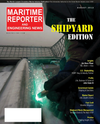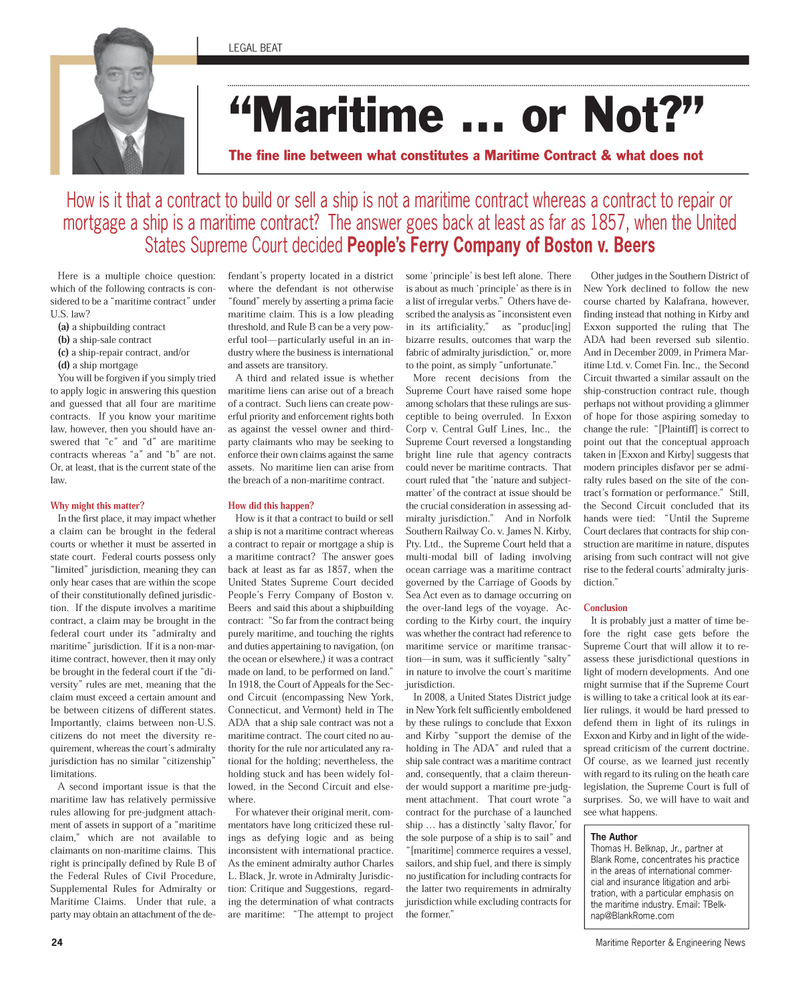
Page 24: of Maritime Reporter Magazine (August 2012)
The Shipyard Edition
Read this page in Pdf, Flash or Html5 edition of August 2012 Maritime Reporter Magazine
24Maritime Reporter & Engineering News LEGAL BEAT ?Maritime ... or Not??The fine line between what constitutes a Maritime Contract & what does not Here is a multiple choice question:which of the following contracts is con- sidered to be a ?maritime contract? underU.S. law? (a)a shipbuilding contract (b)a ship-sale contract(c)a ship-repair contract, and/or (d)a ship mortgage You will be forgiven if you simply tried to apply logic in answering this questionand guessed that all four are maritimecontracts. If you know your maritime law, however, then you should have an- swered that ?c? and ?d? are maritimecontracts whereas ?a? and ?b? are not.Or, at least, that is the current state of the law. Why might this matter? In the first place, it may impact whether a claim can be brought in the federalcourts or whether it must be asserted instate court. Federal courts possess only?limited? jurisdiction, meaning they can only hear cases that are within the scopeof their constitutionally defined jurisdic- tion. If the dispute involves a maritime contract, a claim may be brought in thefederal court under its ?admiralty andmaritime? jurisdiction. If it is a non-mar- itime contract, however, then it may only be brought in the federal court if the ?di-versity? rules are met, meaning that the claim must exceed a certain amount and be between citizens of different states. Importantly, claims between non-U.S. citizens do not meet the diversity re- quirement, whereas the court?s admiralty jurisdiction has no similar ?citizenship?limitations.A second important issue is that themaritime law has relatively permissive rules allowing for pre-judgment attach- ment of assets in support of a ?maritimeclaim,? which are not available to claimants on non-maritime claims. This right is principally defined by Rule B of the Federal Rules of Civil Procedure, Supplemental Rules for Admiralty or Maritime Claims. Under that rule, aparty may obtain an attachment of the de-fendant?s property located in a district where the defendant is not otherwise?found? merely by asserting a prima facie maritime claim. This is a low pleading threshold, and Rule B can be a very pow- erful tool?particularly useful in an in-dustry where the business is international and assets are transitory. A third and related issue is whethermaritime liens can arise out of a breachof a contract. Such liens can create pow- erful priority and enforcement rights bothas against the vessel owner and third- party claimants who may be seeking toenforce their own claims against the same assets. No maritime lien can arise fromthe breach of a non-maritime contract.How did this happen? How is it that a contract to build or sell a ship is not a maritime contract whereasa contract to repair or mortgage a ship is a maritime contract? The answer goes back at least as far as 1857, when the United States Supreme Court decidedPeople?s Ferry Company of Boston v. Beers and said this about a shipbuilding contract: ?So far from the contract being purely maritime, and touching the rightsand duties appertaining to navigation, (on the ocean or elsewhere,) it was a contract made on land, to be performed on land.? In 1918, the Court of Appeals for the Sec- ond Circuit (encompassing New York, Connecticut, and Vermont) held in The ADA that a ship sale contract was not a maritime contract. The court cited no au- thority for the rule nor articulated any ra- tional for the holding; nevertheless, the holding stuck and has been widely fol-lowed, in the Second Circuit and else- where.For whatever their original merit, com- mentators have long criticized these rul- ings as defying logic and as beinginconsistent with international practice.As the eminent admiralty author CharlesL. Black, Jr. wrote in Admiralty Jurisdic- tion: Critique and Suggestions, regard- ing the determination of what contractsare maritime: ?The attempt to projectsome ?principle? is best left alone. There is about as much ?principle? as there is in a list of irregular verbs.? Others have de- scribed the analysis as ?inconsistent even in its artificiality,? as ?produc[ing] bizarre results, outcomes that warp the fabric of admiralty jurisdiction,? or, more to the point, as simply ?unfortunate.? More recent decisions from theSupreme Court have raised some hope among scholars that these rulings are sus-ceptible to being overruled. In Exxon Corp v. Central Gulf Lines, Inc., the Supreme Court reversed a longstanding bright line rule that agency contracts could never be maritime contracts. That court ruled that ?the ?nature and subject-matter? of the contract at issue should be the crucial consideration in assessing ad-miralty jurisdiction.? And in Norfolk Southern Railway Co. v. James N. Kirby, Pty. Ltd., the Supreme Court held that a multi-modal bill of lading involving ocean carriage was a maritime contract governed by the Carriage of Goods by Sea Act even as to damage occurring on the over-land legs of the voyage. Ac- cording to the Kirby court, the inquirywas whether the contract had reference to maritime service or maritime transac-tion?in sum, was it sufficiently ?salty? in nature to involve the court?s maritime jurisdiction.In 2008, a United States District judgein New York felt sufficiently emboldened by these rulings to conclude that Exxonand Kirby ?support the demise of theholding in The ADA? and ruled that a ship sale contract was a maritime contract and, consequently, that a claim thereun- der would support a maritime pre-judg- ment attachment. That court wrote ?a contract for the purchase of a launchedship ? has a distinctly ?salty flavor,? for the sole purpose of a ship is to sail? and?[maritime] commerce requires a vessel, sailors, and ship fuel, and there is simplyno justification for including contracts for the latter two requirements in admiralty jurisdiction while excluding contracts for the former.? Other judges in the Southern District ofNew York declined to follow the new course charted by Kalafrana, however, finding instead that nothing in Kirby and Exxon supported the ruling that The ADA had been reversed sub silentio. And in December 2009, in Primera Mar- itime Ltd. v. Comet Fin. Inc., the Second Circuit thwarted a similar assault on the ship-construction contract rule, thoughperhaps not without providing a glimmer of hope for those aspiring someday tochange the rule: ?[Plaintiff] is correct to point out that the conceptual approachtaken in [Exxon and Kirby] suggests that modern principles disfavor per se admi- ralty rules based on the site of the con-tract?s formation or performance.? Still, the Second Circuit concluded that itshands were tied: ?Until the SupremeCourt declares that contracts for ship con-struction are maritime in nature, disputesarising from such contract will not give rise to the federal courts? admiralty juris- diction.? ConclusionIt is probably just a matter of time be-fore the right case gets before theSupreme Court that will allow it to re- assess these jurisdictional questions inlight of modern developments. And one might surmise that if the Supreme Courtis willing to take a critical look at its ear- lier rulings, it would be hard pressed to defend them in light of its rulings inExxon and Kirby and in light of the wide-spread criticism of the current doctrine.Of course, as we learned just recentlywith regard to its ruling on the heath care legislation, the Supreme Court is full of surprises. So, we will have to wait and see what happens.The AuthorThomas H. Belknap, Jr., partner at Blank Rome, concentrates his practicein the areas of international commer- cial and insurance litigation and arbi-tration, with a particular emphasis on the maritime industry. Email: TBelk- [email protected] is it that a contract to build or sell a ship is not a maritime contract whereas a contract to repair or mortgage a ship is a maritime contract? The answer goes back at least as far as 1857, when the United States Supreme Court decided People?s Ferry Company of Boston v. Beers MR#8 (18-25):MR Template 8/8/2012 11:13 AM Page 24

 23
23

 25
25
